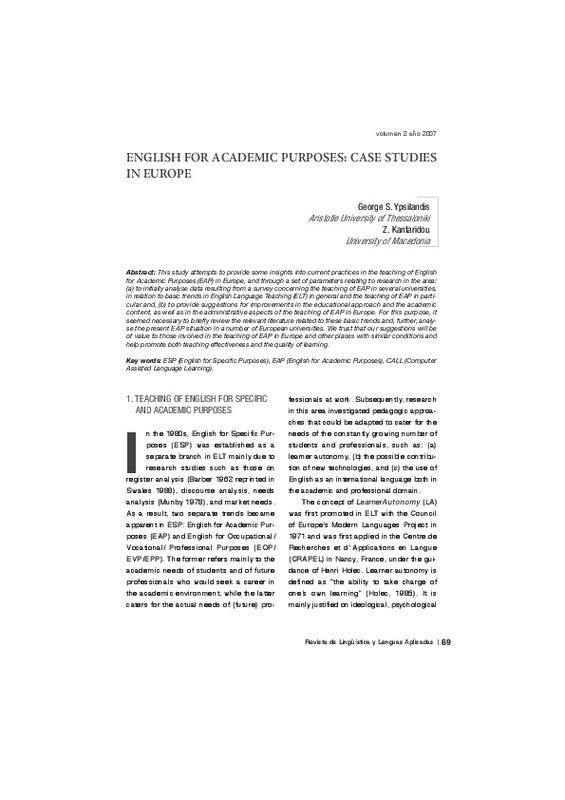Benson, P. (1997). "The philosophy and politics of learner autonomy", in P. Benson & P. Voller (eds) Autonomy and Independence in Language Learning. USA: Addison Wesley Longman, Ltd: 18-34.
Benson, P. & P. Voller. (2001).Teaching & Researching Autonomy in Language Learning. Pearson Education Limited.
Council of Europe. (2001). Common European Framework of Reference for Languages: Learning, teaching, assessment. UK: Cambridge University Press.
[+]
Benson, P. (1997). "The philosophy and politics of learner autonomy", in P. Benson & P. Voller (eds) Autonomy and Independence in Language Learning. USA: Addison Wesley Longman, Ltd: 18-34.
Benson, P. & P. Voller. (2001).Teaching & Researching Autonomy in Language Learning. Pearson Education Limited.
Council of Europe. (2001). Common European Framework of Reference for Languages: Learning, teaching, assessment. UK: Cambridge University Press.
Crabbe, D. (1993). "Fostering autonomy from within the classroom: the teacher's responsibility". System, 21-4: 443-452. https://doi.org/10.1016/0346-251X(93)90056-M
Cuban, L. (2001). Oversold and Underused: Computers in the Classroom. Harvard University Press.
Deci, E. & R. Ryan. (1985). Intrinsic Motivation and self-determination in human behaviour. New York: Plenum. https://doi.org/10.1007/978-1-4899-2271-7
Dillenbourg, P. (1999). "What do you mean by collaborative learning?" In P. Dillenbourg (ed) Collaborative-learning: Cognitive and Computational Approaches. Oxford: Elsevier: 1-19.
Dillenbourg, P., M. Baker, A. Blaye and C. O'malley. (1996). "The evolution of research on collaborative learning" in E. Spada & P. Reiman (Eds) Learning in Humans and Machine: Towards an interdisciplinary learning science: Oxford: Elsevier: 189-211.
Dörnyei, Z. (2001). Motivational Strategies in the Language Classroom. UK: Cambridge University Press. https://doi.org/10.1017/CBO9780511667343
Ellis, R. (2003). Task-based Language Learning and Teaching. UK: Oxford University Press.
Fox, J., B. Labbett, C. Matthews, C. Romano-Hvid and J. Schostak. (1992). New Perspectives in Modern Language Learning. Employment Department Group.
Graves, K. (1996). Teachers as Course Developers. USA: Cambridge University Press. https://doi.org/10.1017/CBO9780511551178
Henning, G. (1987). A guide to language testing: Development, evaluation, research. New York: Newbury House.
Holec, H. (1985). "On autonomy: some elementary concepts", in P. Riley (ed.) Discourse and Learning. London: Longman: 173-190.
Kantaridou, Z. (2004). Motivation & Involvement in Learning English for Academic Purposes. Unpublished PhD Thesis, Department of English Language & Literature: Aristotle University of Thessaloniki.
McNamara, T. (2000). Language Testing. Oxford University Press.
Munby, J. (1978). Communicative Syllabus Design. UK: Cambridge University Press.
Pintrich, P.R. (1999). The Role of Motivation in Promoting and Sustaining Self-Regulated Learning. International Journal of Educational Research, 31: 459-470. https://doi.org/10.1016/S0883-0355(99)00015-4
Schneider, B., M. Csikszentmihalyi & S. Knauth. (1995). "Academic challenge, motivation, and self-esteem: the daily experiences of students in high school", in M. Halliman (ed.) Restructuring Schools: Promising Practices and Policies. New York: Plenum Press: 175-195. https://doi.org/10.1007/978-1-4899-1094-3_10
Swales, J. (1988). Episodes in ESP. UK: Prentice-Hall International Ltd.
Wong, M.M. & M. Csikszentmihalyi.(1991). "Motivation and academic achievement: thee ffects of personality traits and the quality of experience", Journal of Personality, 59-3: 539-574.
Ypsilandis, G. S. (1995). Computer Assisted Language (CALa): A Communicative Approach. Unpublished Ph.D. Thesis.
Ypsilandis, G. S. (2002). "Feedback in Distance Education" C.A.L.L. Journal, 15-2: 167-181.
Ypsilandis, G. S. and Zourou, K. (in print). "Decoding the Monster" in the proceeding of the ELSII conference in Belgrade organised by the department of English studies of the University of Belgrade.
[-]








